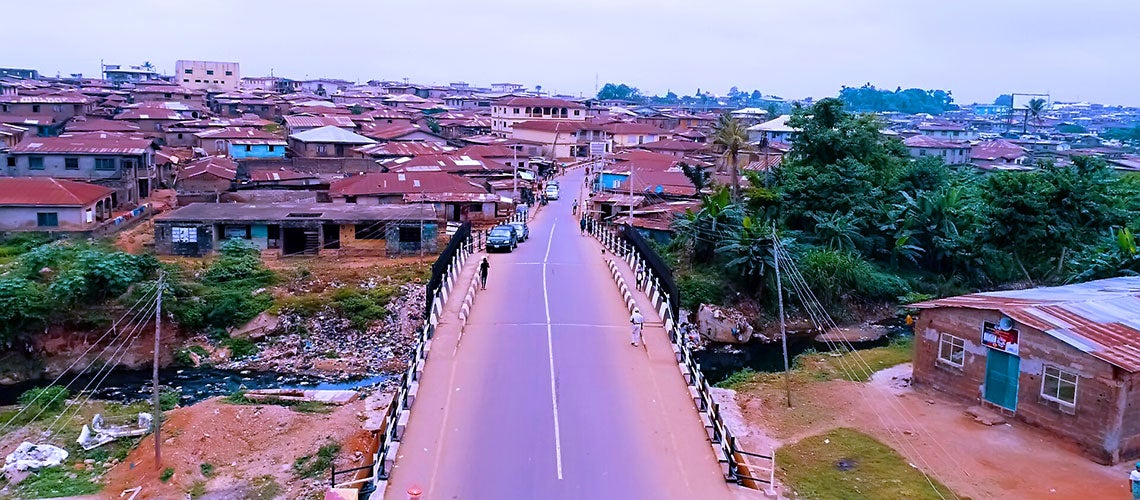 Ogbere-Moradeyo area. Ibadan City, Nigeria.© Abiodun Adefioye
Ogbere-Moradeyo area. Ibadan City, Nigeria.© Abiodun Adefioye
Ibadan is the third most populous city in Nigeria—Africa’s largest country in terms of population and economy. This city of six million also happens to be the country’s largest in terms of geographic area, but like many other cities, urbanization is largely uncontrolled, and people are exposed to disasters like floods.
We had the opportunity to experience Nigeria’s creativity and innovation in Lagos city, when the World Bank partnered with Co-Creation Hub and other players to organize a hackathon that focused on leveraging data and technology to improve accountability and service delivery in governance. People, including data and software engineers, professional and academic experts, and civil servants, came together to develop solutions for improved policy, governance and development impact.
The Ibadan Urban Flood Management Project (IUFMP) —set up to tackle the city’s urban resilience challenges—submitted datasets for the hackathon, and one of the teams that worked on the data from the project emerged as winner in February, 2020. Teams developed a geospatial visualization platform to overlay and view the datasets from the geodatabases created as part of the Ibadan city, and flood and drainage masterplans preparation, demonstrating how the government and other stakeholders can use insights from geospatial data to accelerate effective decision making in urban planning, flood risk and environmental management. With this open data, the state government can now use up-to-the-minute information to identify, manage, prevent, and prepare for flood risks, and other ensuing impacts from floods.

Building on this with support from the Global Facility for Disaster Reduction and Recovery and with the collaboration of technical initiatives from experts in Ibadan and around Oyo state, the project scaled up the use of data for flood risk management and developed an advanced geospatial visualization platform that empowers the government to seamlessly apply geospatial data in daily operations.
This innovation strengthens the capacity of the Oyo state government to manage flood risk and inform decision making in other sectors in Ibadan using data, coupled with previous capacity building efforts, gigabytes of geospatial data available and GIS innovation laboratories have been setup under the project. The labs established at the department of Urban Renewal Enforcement Monitoring and Compliance and Office of the Surveyor General under the Oyo State Ministry of Lands, Housing and Urban Development. The Project Implementation Unit has been equipped with computers, servers, printers, plotters and software needed to apply these datasets in decision making. These datasets, which are publicly available via an advanced geospatial visualization platform, now strategically inform technical decision making and engagements. This enhances urban resilience and disaster risk management, aligning strongly with the Oyo State Government’s E-governance Program and leveraging internet connectivity infrastructure provided by the government in locations where the labs are present to facilitate data exchange.
From the people to policy—students sparking innovation
In August, the University of Ibadan and the project signed a formal memorandum of understanding, to foster capacity development, knowledge exchange and promote long-term project sustainability through collaborative research, data information exchange, internship programs for students, short courses and training programs for government staff and other professionals, and all-round collaborations that bridge the academic-policy-industry gap through open data and innovation.
With the rising thirst for innovative responses to managing flood risks in Ibadan, the University of Ibadan, in collaboration with the project, GIS Konsult Limited and other partners hosted the second season of the Ibadan Geo-Hackathon completed in November with the theme, “Ibadan Urban Resilience,” leveraging the advanced geospatial visualization platform and geodatabases to deliver solutions focusing on three thematic areas: risk-informed decision making, urban resilient design, and innovative technology solutions for urban resilience. The winning submissions for the respective categories include: Smart Citi, a web-based application for automated flood-risk assessment and waste management,, and Flood Health Risk Mapper an industrial research innovation, and Fire Incidents - A Reoccurring Menace, a story on disaster resilience. The city of Ibadan has now developed two comprehensive masterplans: A Flood Risk Management and Drainage Masterplan and a City Masterplan. Both documents create a vision for resilient and sustainable urban development in the face of climate change, identifying opportunities to boost inclusive economic development, and identify and prioritize the structures most at risk of failing (bridges, culverts, drainages, dam, etc.) to strengthen the government's capacity to detect and respond more effectively to floods, and build resilience long-term. The amount of data, maps and information generated by these master plans is vast. They include spatial datasets, light detection and ranging (LiDAR) topography, high resolution aerial imagery, and outputs of urban analytics, hydrological and hydraulic modelling. By making this information accessible to the public, it becomes useful for many stakeholders, and will inform individuals, private sector, and government decision making to better manage risks and improve urban development.
Open data for innovation and entrepreneurship in development
Entrepreneurship is on the rise—and so is innovation and collaboration for the benefit of all. With data open and publicly accessible, businesses, academia and university students alike can utilize information for research and development. This innovation helps civil servants in their work as they tactically tackle disaster and urban development challenges. In turn, the increased resilience helps everyone from kindergarteners to tailors, and keeps the city’s six million people protected from preventable disaster risks. That’s the impact of open data, open governance, and effective resilience building—all together, they spark cooperation, preparedness and innovation for the benefit of everyone.





Join the Conversation